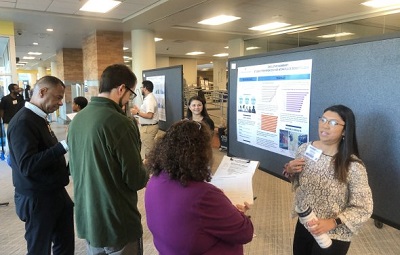Coping Strategies and College Student Marijuana Use: The Mediating Role of Protective Behavioral Strategies
Description/Abstract/Artist Statement
Literature suggests adaptive and maladaptive coping strategies influence marijuana outcomes. Marijuana-protective behavioral strategies (MPBS), behaviors aimed at reducing marijuana-related harm, may explain this link. Moreover, this mediational relationship may be influenced by sex, with men experiencing elevated risk. However, these associations have been tested previously. Thus, the present study explored MPBS as a mediator for the relationship between coping style and marijuana problems, while examining sex as a moderator. It was hypothesized that 1) greater avoidant coping is related to greater marijuana use problems via lower MPBS, 2) greater problem-focused coping is related to fewer marijuana use problems via higher MPBS, and 3) both mediations would be moderated by sex, such that being male would strengthen the mediation. Participants were 2,508 colleges students (Mage = 21.94, SD = 1.95; 73.8% female, 41.3% white) who completed a self-report online survey. Results indicated MPBS use did not mediate the link between avoidant coping and marijuana problems. However, MPBS use mediated the negative association between problem-focused coping and marijuana problems, (B = -.049, SE = .022, 95% CI [-.10, -.01]). Sex did not moderate either model. Results suggest individuals who utilize adaptive coping are less likely to experience marijuana problems, potentially due to the increased use of MPBS. In addition, results indicate this pathway is not dependent on one’s sex, suggesting that the associations may operate similarly among women and men. Findings suggest that interventions targeting marijuana harm reduction in college students may benefit from increasing MPBS use and problem-focused coping behaviors.
Faculty Advisor/Mentor
Cathy Lau-Barraco
Faculty Advisor/Mentor Department
Psychology
College Affiliation
College of Sciences
Presentation Type
Oral Presentation
Disciplines
Clinical Psychology
Session Title
College of Sciences 5
Location
Learning Commons @Perry Library, Room 1311
Start Date
3-30-2024 12:00 PM
End Date
3-30-2024 1:00 PM
Coping Strategies and College Student Marijuana Use: The Mediating Role of Protective Behavioral Strategies
Learning Commons @Perry Library, Room 1311
Literature suggests adaptive and maladaptive coping strategies influence marijuana outcomes. Marijuana-protective behavioral strategies (MPBS), behaviors aimed at reducing marijuana-related harm, may explain this link. Moreover, this mediational relationship may be influenced by sex, with men experiencing elevated risk. However, these associations have been tested previously. Thus, the present study explored MPBS as a mediator for the relationship between coping style and marijuana problems, while examining sex as a moderator. It was hypothesized that 1) greater avoidant coping is related to greater marijuana use problems via lower MPBS, 2) greater problem-focused coping is related to fewer marijuana use problems via higher MPBS, and 3) both mediations would be moderated by sex, such that being male would strengthen the mediation. Participants were 2,508 colleges students (Mage = 21.94, SD = 1.95; 73.8% female, 41.3% white) who completed a self-report online survey. Results indicated MPBS use did not mediate the link between avoidant coping and marijuana problems. However, MPBS use mediated the negative association between problem-focused coping and marijuana problems, (B = -.049, SE = .022, 95% CI [-.10, -.01]). Sex did not moderate either model. Results suggest individuals who utilize adaptive coping are less likely to experience marijuana problems, potentially due to the increased use of MPBS. In addition, results indicate this pathway is not dependent on one’s sex, suggesting that the associations may operate similarly among women and men. Findings suggest that interventions targeting marijuana harm reduction in college students may benefit from increasing MPBS use and problem-focused coping behaviors.


